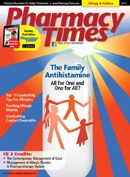Publication
Article
Pharmacy Times
Asthma and Allergy
Case 1—Asthma
RL is a 38-year-old man who comes to the pharmacy to refill his prescription for an albuterol inhaler. Upon reviewing his pharmacy profile, you realize he is refilling this medication 10 days early. His pharmacy profile also reveals that he has diabetes and hypertension, based on his history of filling prescriptions for lisinopril/hydrochlorothiazide 20/25 mg daily, metformin 1000 mg twice daily, and exenatide (Byetta) 10 mcg subcutaneously twice daily at your pharmacy. You ask how he has been feeling lately, and he states he been experiencing more frequent episodes of shortness of breath that have been occurring 4 or 5 times a week for more than the past 3 weeks. He also states his blood sugar readings have been running high, between 200 and 300 mg/dL, for a little longer than the past week. He asks you if he can purchase an epinephrine inhaler (Primatene Mist), because he remembers using that years ago when his asthma was better controlled. What would you recommend to RL at this time?
Answer
RL would not be a candidate for using an epinephrine inhaler because of his poorly controlled diabetes and history of hypertension. Contraindications to selftreatment with an epinephrine inhaler include pregnancy, cardiac arrhythmias, coronary insufficiency, poorly controlled hypertension, seizures, hypokalemia, angina, hyperglycemia, and uncontrolled hyperthyroidism. 1 Other exclusions for RL for self-treatment are based on him describing his prescription medication (ie, albuterol) as ineffective and his reporting symptoms consistent with moderate persistent asthma. 2
Self-treatment with an epinephrine inhaler is recommended for intermittent (shortness of breath occurring less than twice weekly) symptom relief in patients who have a prior diagnosis of asthma. The epinephrine inhalers should only be used for mild symptoms lasting less than 24 hours or for short-term (ie, less than 24 hours) treatment of mild symptoms until the individual can be seen by a health care provider. 3 Because RL does not qualify for self-treatment, it would be best to recommend he call his physician for an appointment. His symptoms are likely due to poorly controlled or worsening asthma severity, and physician referral is warranted.
Case 2—Allergy
MR is a 26-year-old woman who reports to the pharmacy seeking a product for treatment of her allergies. MR reports visiting her best friend a month ago to meet her new cat. Within a few minutes of her visit, she experienced sneezing, a runny nose, and itchy, watery eyes. She remembers her symptoms went away an hour or so after she left her friend’s house. She says these symptoms have occurred during each subsequent visit, and each time her symptoms seem to get worse and last longer than the previous visit. Her physician recommended she pick up an OTC antihistamine, and she would like you to suggest a product for her. What product would you recommend to MR so that she can continue to visit her friend?
Answer
MR most likely has allergic rhinitis when exposed to her friend’s cat. Because MR does not own the cat, allergen avoidance is the primary nonpharmacologic measure. If she could avoid spending time at her best friend’s house and meet at other locations, that would be the best option. If she is going to be exposed to the cat, she can follow her physician’s recommendation of taking a long-acting antihistamine (eg, loratidine or cetirizine). She should take the long-acting antihistamine a few hours prior to being exposed to the allergen to prevent the onset of symptoms such as runny nose and itchy eyes. If she is being exposed to the cat daily, she should take the medication as recommended by the package labeling once daily.
Dr. Patel is a clinical pharmacist in North Brunswick, New Jersey, and clinical assistant professor, Ernest Mario School of Pharmacy, Rutgers University. Dr. Bridgeman is an internal medicine clinical pharmacist in Trenton, New Jersey, and clinical assistant professor, Ernest Mario School of Pharmacy, Rutgers University.
References
1. Primatene Mist drug facts. http://primatene.com/products/label_mist.asp. Accessed February 19, 2011.
2. Global Initiative for Asthma (GINA). Global Strategy for Asthma Management and Prevention. www.ginasthma.com. Updated 2009. Accessed February 25, 2011.
3. Scolaro K. Disorders related to colds and allergy. In: Berardi RR, Ferreri SP, Hume AL, et al (eds). Handbook of Nonprescription Drugs: An Interactive Approach to Self-Care. 16th ed. Washington, DC: American Pharmacists Association, 2009:177-202.

Newsletter
Stay informed on drug updates, treatment guidelines, and pharmacy practice trends—subscribe to Pharmacy Times for weekly clinical insights.






